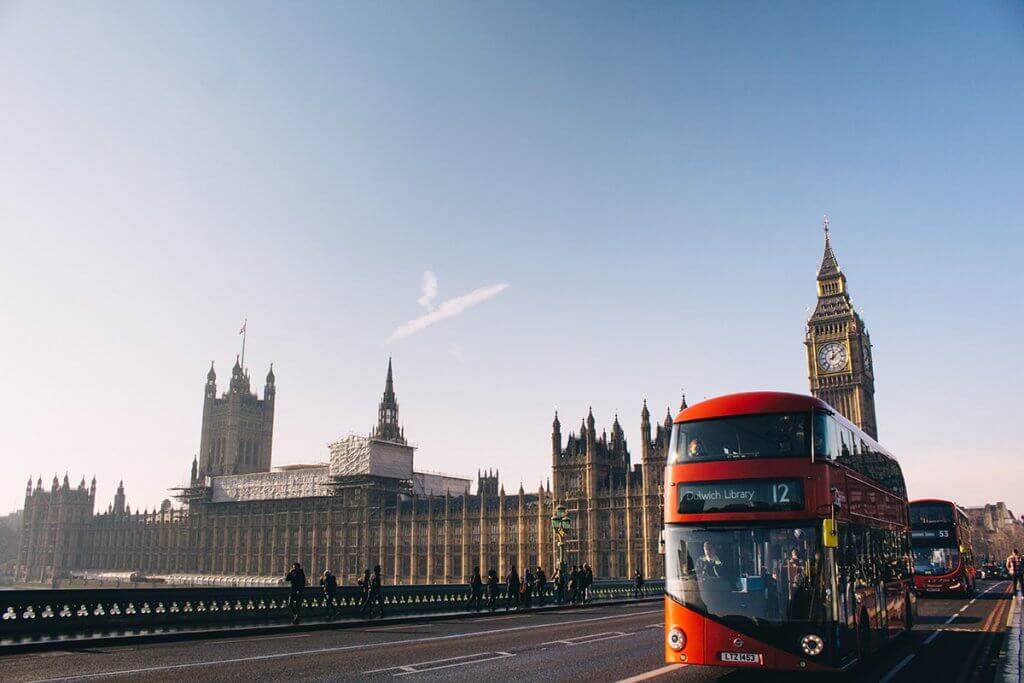Everything You Need to Know About Moving from New Zealand to the United Kingdom
The London OE is seen as a right of passage for many young New Zealanders, but that doesn’t mean that’s all the UK is good for. Yes it’s a hot spot for young people eager to expand their horizons while they figure out what they want out of life, but it’s also a great place to take that next step in your career or start a family.
So, whether for work or for the opportunity to experience London life, we’re here to help you make this big move.
Customs
Australian Visa
 |
You will need a visa if you’re planning on moving to the UK to work. Luckily, they have a lot of online resources, including a quick questionnaire, to help you figure out which visa you’ll need.
If you’re being transferred by your company, they will need to sponsor your for a Tier 2 (Intra-company Transfer). If you’ve been offered a skilled job, you will be sponsored for a Tier 2 (General) visa. For everyone else looking to work in the UK for an extender period, there are a range of Tier 1 visas including Investor, Entrepreneur, Graduate Entrepreneur and Exceptional Talent. |
Quarantine
 |
Like most countries, the UK has a list of items they won’t allow you to bring with you. Beyond the usual illegal drugs and offensive weapons such as flick knives, they also don’t allow:
|
|
 |
If you’re bringing a pet with you, there are some things you’ll need to do before your move. Firstly, your pet needs to arrive within five days of you and you’ll need to use an approved travel company.
Cats, dogs and ferrets are fairly easy to get through customs as long as they are microchipped and have a pet passport or official veterinary certification. Your Grace consultant can help you with all of these |
Money
Currency
 |
The official currency of the UK is the pound sterling, usually referred to as the pound. It is divided into 100 pence, meaning £1 = 100p. Common notes include £5, £10, £20, £50 and £100, and the coins in circulation are 1p, 2p, 5p, 10p, 50p, £1 and £2.
While the names are different, their notes are just as colourful as ours, so that’ll help you differentiate between them. To get confusing though, Scottish or Irish bank notes are different from English and Welsh notes. They’re all legal tender, but some English or Welsh shopkeepers may not accept them if they are uncertain about how to check their authenticity. This shouldn’t present a problem, but it’s good to keep it in mind. If it does come up, banks will exchange the notes free of charge. Also, the euro isn’t widely accepted in the UK, but the Republic of Ireland does use it. Grace is pleased to partner with XE Money Transfer to assist our relocation clients who are transferring funds internationally. |
Banking
 |
You have two options for opening a UK bank account. The first is doing so once you arrive, providing your chosen bank with copies of:
|
|
 |
Alternatively, you can open an account online, from New Zealand. This is probably the more complex option, as you’ll still need the above paperwork, but with your new UK address. You can talk to your bank and employer to send through documents with your updated address, but most people find it easier to wait until they’ve actually touched down.
Some banks offer international accounts, but these can be challenging to open and may require substantial deposits. There will be a lot of research involved to find your best fit, but a good place to start is some of the big banks, including: At the end of the day, selecting a bank to use is a very personal journey. You will need to consider your income, needs and preferences, so research is required to find your best fit. While opening an account before you arrive would seem preferable, it is easier to do so once you’ve arrived and already have everything else sorted. |
Taxes
 |
To work in Australia, you will need a tax file number (TFN). This allows the Australian Taxation Office (ATO) to collect income taxes throughout the year. It’s a simple process to apply for a TFN, easily done online. You will need your passport and Australian address to complete the process. | |
 |
The UK taxation system uses a tax-free threshold and income bands. In addition to income tax, there are also property, capital gains, UK inheritance and Value Added taxes. Once you arrive in the UK, you are going to need to apply for a National Insurance number.
Your tax rate isn’t affected by your residency, though it can change what incomes are taxed. If you’re judged a resident for tax purposes, all income will be included, rather than just income earned in the UK. You’re considered a resident for tax purposes if you spend most of the year in the UK, buy and live in a house in the UK, and/or work in the UK. The tax year in the UK runs from the 6th of April through to the 5th of April of the next year, giving a 2019/2020 notation. If you want to get an estimation of your tax, there are government calculators available. One last thing, the Value Added Tax is a sales tax. Most goods are taxed at 20%, though 5% applies to certain items and some items are completely exempt. It is paid by the seller and is automatically absorbed into purchase price, so it’s not something you need to worry about. |
Health Insurance
 |
Healthcare in the UK is largely publicly funded through the National Health Service (NHS). This service is controlled separately by each country within the United Kingdom, but this often has little effect on patients accessing care. Private healthcare is largely uncommon, usually used for alternative and complementary treatments.
Some services are free regardless of residence status, such as emergency care; family planning services; services for the treatment of certain communicable and sexually transmitted diseases; services for the treatment of torture, domestic violence and sexual violence; and, palliative care. There is a health surcharge attached to visas longer than six months, allowing visa holders to access the NHS. Further information can be found on the NHS website. |
Cost of Living
 |
The cost of living in the UK is heavily dependent on where you’re moving to, as housing costs will represent a large percentage of your expenses.
The cost of living in London is the highest, but places like Manchester and Birmingham provide more affordable options. Utility costs and public transport can seem a little pricy, and operating a vehicle can be expensive, but all in all life in the UK doesn’t have to break the bank. Of course, your lifestyle is going to greatly affect this. |
Setting up Home
Buying vs Renting
 |
If you know you’ll only be in the UK for a fixed period of time, even if it is for the next five to ten years, you probably don’t want to be buying a home. But if you’re thinking of making the move permanent, then buying your new home may be the right choice.
Buying obviously incurs more upfront costs, including a mortgage deposit, stamp duty and legal fees. |
|
 |
Renting can be a viable option as you find out where exactly you want to live through short term and rolling leases. There is also greater flexibility with renting, though if you’re not going through an estate agent, you may find it hard to know and access your rights as a tenant. Landlords can increase the rent whenever your tenancy agreement ends, or even decide to discontinue the lease, which can leave you in a pinch.
Websites such as Zoopla, Homefinder UK and Rightmove give you a place to start looking for your next home whether renting or buying. |
Utilities
 |
Coordinating and connecting utilities anywhere can be a bit of a headache, and the UK is no different. If you’re renting, your rental agent or landlord may be able to arrange this for you, but if you’re buying, you’ll need to go it alone. Upside, it’s not that hard and can be done online depending on the company. Most of the time, all you have to do is transfer the services into your name.
Because the utilities sector is privatised, there are a lot of options regarding companies and deals. The downside of this is the amount of research you’ll have to do to find the best option for your needs in your new home. Luckily there are many comparison sites, including:
Water companies in the UK are regional, so the company you use will be dictated by who operates in your area. Bills are paid monthly. Gas and electricity bills are usually every three months, following a reading of your meter. Most companies will provide a variety of payment options, including monthly direct debits if that is easier to manage within your budget. A note on waste: the UK takes recycling seriously and their laws on the matter are pretty strict. You will need to separate your rubbish into the appropriate containers, and they will be rejected if it’s not done properly. |
Internet and Phone
 |
One of the first things you’re going to want to do when you move in is organise phone, internet and television services. This is doubly true if you’re moving with teenagers.
Most providers will bundle your communication services, so having a look around for the best deal for you is definitely suggested. This is a highly competitive sector, so you will have plenty to choose from, though sometimes your location can narrow your options. Some of the largest providers include British Telecom (BT), Plusnet, TalkTalk, Sky and Virgin. Luckily, sites like uSwitch, Compare the Market, GoCompare and MoneySuperMarket provide a means to compare your options. |
|
 |
All UK homes have access to digital freeview, requiring a modern television and aerial, but you will need to buy a TV licence to access the BBC. The licence also allows you to watch tv via computer, tablet and game consoles.
There are about 70 freeview channels, though you can also purchase a digital box to access streaming services or sign up for cable or satellite television such as Sky or Virgin Media. You can check out your options, and if service is available in your area, at www.cable.co.uk. |
Getting Around
Public Transport
 |
Great Britain’s rail network is the oldest of its kind in the world, London buses are iconic, and their Black Cabs are famous, but the public transport network overall is run by numerous companies and can be confusing for new arrivals.
You can use services such as Traveline to plan your journey. If you’re going to use public transport extensively, it’s a good idea to invest in bulk style tickets where possible. For the most part, public transport is your best bet if you’re living in or around one of the larger cities. Parking can be a hassle and congestion is a major concern in London in particular. |
Driver’s Licence
 |
You can drive up to twelve months on your current licence from the date you arrive in the UK. After that, you’ll need to organise exchanging this for a British licence.
Manual transmission is more common in the UK, so if you’re more comfortable in an automatic it may take a little longer to find a car that suits your needs. Keep in mind that speed limits are 30mph for towns and cities, 60mph for single-lane carriageways and 70mph for dual-lane carriageways and motorways. Most road rules are similar to New Zealand, though drivers should note that there is a Congestion Charge for driving in certain zones at certain times in London. |
Importing your car to the United Kingdom
 |
There are a lot of steps to importing a vehicle to the UK, all of which Grace can help you with. Once it’s in the country, you’ll need to have it approved, registered and insured before you can drive it. And don’t forget about your new number plates and a miles per hour speedo.
It’s not the most prohibitive process, but there is a definite advantage to getting a professional to do it for you. |
Buying and registering a car
 |
If you decide you really need a car and the confusing roads, expensive petrol, bad parking and slightly horrifying country roads don’t turn you off, then buying a car may be for you. A few things to keep in mind when buying though:
Some places you can search for cars include Motors, AutoTrader and BuyaCar. |
Children
School Options
 |
There are numerous options when it comes to education in the UK and it can be overwhelming, with many factors to consider in your decision-making process. How long will you be staying? Will your children go through the entire UK school system, or will you be moving countries again in future? These are particularly pertinent if you’re moving for work and are only going to stay for a set period of time.
Children in the UK attend school full time from the first September after their fourth birthday, entering secondary school in the September following their eleventh birthday. Kids are expected to remain at school until sixteen and continue some form of education until eighteen. Options for education include state schools, which can include academies, free schools, grammar schools and maintained boarding schools. Each will have its own entrance requirements and research is key to finding, and securing, the best place for your child. Grammar schools include entrance exams and may only accept students from catchment areas. Applications will have deadlines attached to them, so don’t leave your hunt to the last minute. |
|
 |
International schools, providing curriculum from home countries, are a popular choice for those knowing they won’t be staying in the UK for an extended period of time. These institutes tend to be more pricey, so ensure the fee structure is within your budget before going through the application process. Some may have non-refundable application fees, so keep that in mind.
Independent schools are self-governing and charge their own fees. Again, you will need to research the admissions requirements, as these can be vastly different from school to school. Fees also vary dramatically, with boarding schools obviously being more expensive than day schools. If this a permanent move, a state school may be the best choice, whereas international schools provide consistency for families that expect to move again in a few years. |
|
After School Care |
||
 |
There are a few options when it comes to childcare outside of school or during work hours, and as with everything else, you need to choose what suits you, your family and your budget.
You can go with registered childminders, who care for kids within their homes. They are self-employed and may offer to look after pre-school children and kids at school outside of school hours as needed. You will need to negotiate rates and associated factors with them directly. There are also day nurseries, which can include private, community, council and workplace options. These are also inspected and registered by the same authorities as childminders, though they generally only take children up to age five. Part-time care is offered by pre-school facilities such as playgroups, early education, nursery classes and out of school services. These are best suited for children aged three to five, giving part-time daycare services. Out of school facilities can include a breakfast club before school, an after-school club and activities during school holidays. Finally, you can hire a nanny for a more flexible option. Some may be registered in a similar manner to childminders, but it is still your responsibility to hold an interview, request references and examine their record. Nannies can be a more cost prohibitive option, but you do get peace of mind knowing that your child is being cared for within your own home. |
|
Higher Education
 |
The UK’s higher education system is pretty straight forward. There are a range of undergraduate and post graduate degrees offered by some of the best universities in the world, with other undergraduate courses such as diplomas also offered.
Costs do vary from university to university, but there are also scholarship schemes available. The best course of action is to find what suits your needs, and the needs of your children, and work from there. Higher education in the UK is truly top notch, so the price tag is very often worth it. |
Work Stuff
 |
If you don’t already have a position lined up before your move, you can start by having a look at current market shortages and positions in demand. This can give a you a good place to start as you try to break into one of the largest economies in Europe.
Speaking a second (or third or fourth) language is a big advantage, as long as your English skills are also quite strong. If you can’t find your own profession in the shortage list, you can always pursue additional training to become a language teacher as they are always in need. If you are trying to get your qualifications recognised for work, start with UK NARIC. They’ll be able to tell you how your qualifications compare to UK standards, for a fee. The British work environment is pretty similar to our own and you shouldn’t find it too hard to fit in. Though you will need to keep an eye out for the more subdued British sense of humour and potentially cutting wit. There are numerous ways and means to find a job in the UK, ranging from company websites through to online job boards. This is made even more complex through the rise of professional social networking, such as LinkedIn. The most used are Indeed and Gumtree, but it’s always good to do your own research to find the best avenue to sell your skills to prospective employers. |
Contact Grace
 |
You’ve packed your bags, prepared yourself for the temperature drop and even started drinking tea to work up a taste for it, but are you really ready to go? Call the professionals at Grace and let us take the stress out of what will be your biggest move. We can manage it all, from shipping your furniture through to making sure your furry friend moves in with you.
Contact Grace today and we’ll find you the best solution for your big move. We take the stress out of international moving, so give us a call on 0800 472 2369 or use our quick quote tool. |


